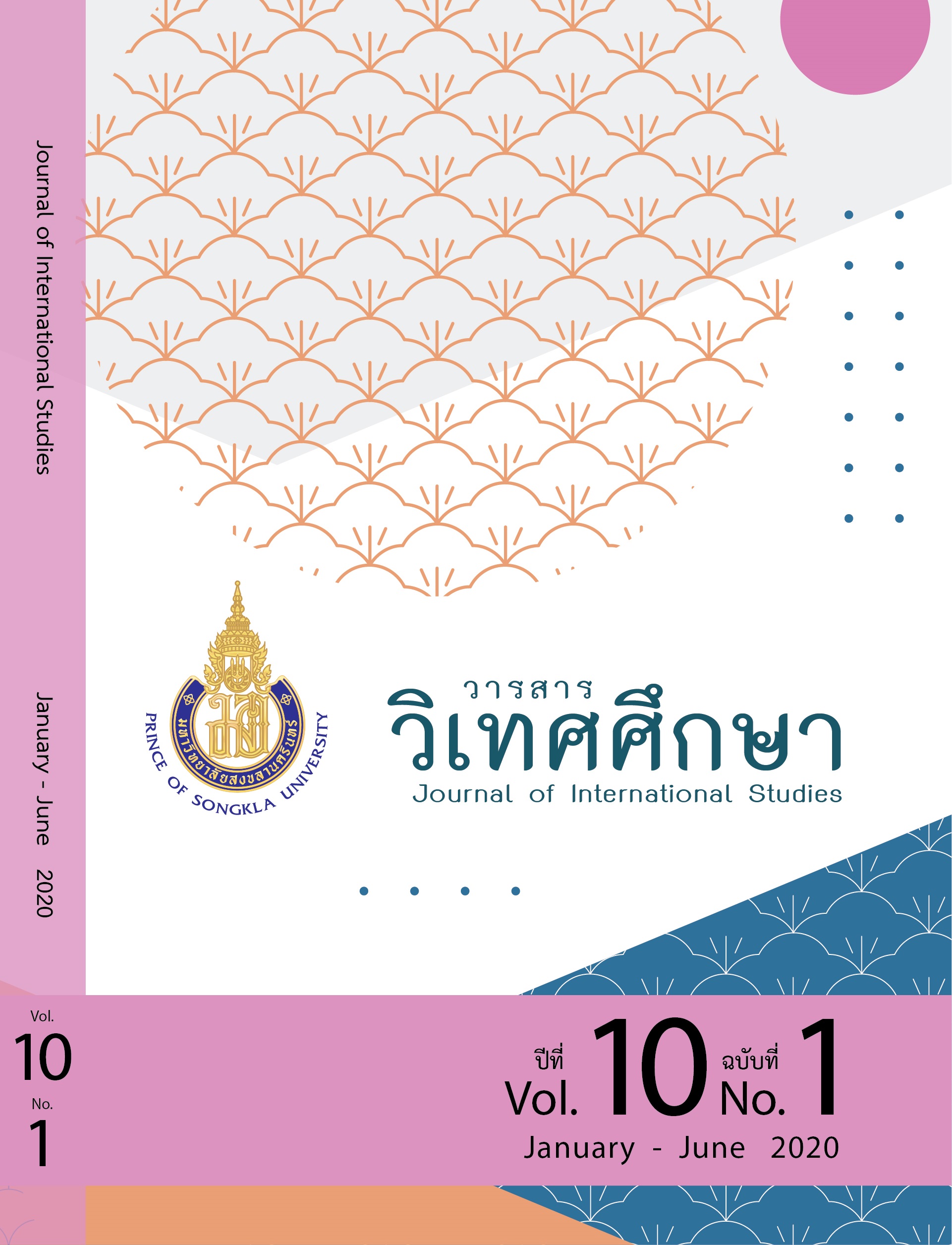Service Quality and Satisfaction of Chinese Wellness tourists
Main Article Content
Abstract
The objectives of this study were to assess the expectation and satisfaction toward health service quality factors and investigate the relationship between service quality factors and overall satisfaction and the likelihood to return for Chinese health tourists in Phuket. Questionnaire was used to collect data from 410 Chinese health tourists in Phuket. Convenience Sampling was utilized. The results showed that the majority of Chinese health tourists were female, in the age of 20-37 years old, first time visitors for health tourism in Thailand with the average range of stay at 1 – 2 weeks. Most of them use both medical and wellness services while staying in Phuket. The most popular medical service for Chinese health tourists was anti-aging and the most popular wellness service was spa. When compare the expectation and satisfaction toward 5 service quality factors, the results found that the expectation is higher than satisfaction in products and services, price and place while the expectation is lower than satisfaction in personnel. Additionally, there was no significant difference between expectation and satisfaction in physical environment. Lastly, there was a positive relationship between service quality and the overall satisfaction and there was also a positive relationship between service quality and the likelihood to return. Out of 5 factors, physical environment and price showed the highest influence on both the overall satisfaction and the likelihood to return.
Article Details
Statements and opinions expressed in articles herein are those of the authors and do not necessarily reflect the position of the editors or publisher.
Article, information, text, image, etc. which are published in Journal of International Studies, belong to Journal of International Studies. If anybody or any organization would like to use part or whole of them, they must receive written permission from Journal of International Studies before usage.
References
กนกวรรณ ทองรื่น. (2555). ปัจจัยที่มีผลต่อการตัดสินใจใช้บริการคลินิกความงามของผู้บริโภคในจังหวัดสระบุรี (การค้นคว้าอิสระสาขาบริหารธุรกิจ). ม.ป.ท.: มหาวิทยาลัยเทคโนโลยีราชมงคลธัญบุรี.
กรมสนับสนุนบริการสุขภาพ. (2558). กรมสบส.ขับเคลื่อนนโยบาย Medical Hub ไร้รอยต่อมุ่งสู่เมืองแห่งสุข ภาวะความเป็นเลิศด้านบริการสุขภาพ. ค้นเมื่อ 20 กุมภาพันธ์ 2562, จาก https://www.thailandmedicalhub.net:8443/display_news.jsp?id=N00000002198
กรวรรณ สังขกร, อาชว์บารมี มณีตระกูลทอง และกาญจนา จี้รัตน์. (2559). ความคาดหวังและความพึงพอใจของนักท่องเที่ยวจีนในประเทศไทย หลังกระแสภาพยนตร์ The Lost in Thailand (รายงานผลการวิจัย), ศูนย์วิจัยและพัฒนาการท่องเที่ยว สถาบันวิจัยสังคม มหาวิทยาลัยเชียงใหม่. ค้นเมื่อ 15 มกราคม 2562, จาก http://www.sri.cmu.ac.th/~ctrd/uploads/files/file_20171208_1512707714.pdf
ชนิดา ทวีศรี. (2551). การท่องเที่ยวเชิงสุขภาพ (Health Tourism) . ค้นเมื่อ 12 มีนาคม 2562, จาก https://www.l3nr.org/posts/166878
ณัฏฐิรา อำพลพรรณ. (2556). แนวโน้มการท่องเที่ยวเชิงสุขภาพและความงาม (Spa and Wellness). จุลสารวิชาการการท่องเที่ยว, ฉบับที่ 4/2556 (ตุลาคม - ธันวาคม 2556). ค้นเมื่อ 12 มีนาคม 2562, จาก http://www.etatjournal.com/web/menu-read-web-etatjournal/menu-2004?catid=0&id=546
ทัศนา เกื้อเส้ง, เยาวดี ศรีราม และวิทิต บัวปรอท. (2555). ความคาดหวังและความพึงพอใจของนักท่องเที่ยวต่อการจัดสภาพแวดล้อมในแหล่งท่องเที่ยวน้ำตกทรายขาว (รายงานผลการวิจัย). ยะลา: มหาวิทยาลัยราชภัฏยะลา. ค้นเมื่อ 18 มีนาคม 2562, จาก http://park.dnp.go.th/dnp/research/TKWF2.pdf
ลภัส อัครพันธุ์. (2559). นักท่องเที่ยวจีนยังแกร่ง แม้เศรษฐกิจจีนชะลอตัว, SCB Economic Intelligence Center. ค้นเมื่อ 20 มีนาคม 2562, จากhttps://www.scbeic.com/th/detail/product/1936
ฤดี หลิมไพโรจน์. (2558). อิทธิพลของภาพลักษณ์และความพึงพอใจของนักท่องเที่ยวที่ส่งผลต่อการกลับมาท่องเที่ยวซ้ำของนักท่องเที่ยวที่จังหวัดปทุมธานี. ปทุมธานี: มหาวิทยาลัยกรุงเทพ.
ศศิพงษ์ บุญยงค์. (2015). MEDICAL TOURISM: เที่ยวเทรนด์ใหม่ เที่ยวเชิงสุขภาพ. ค้นเมื่อ 19 มีนาคม 2562, จากhttp://horizon.sti.or.th/node/5
ศูนย์วิจัยกสิกรไทย. (2555). การท่องเที่ยวเชิงสุขภาพอาเซียนปี 55 : สร้างรายได้สะพัดในไทยกว่า 2,500 ล้านบาท. ค้นเมื่อ 10 มกราคม 2562, จาก http://www.thai-aec.com/616
สุกัญญา สุขวงศ์. (2558). ทัศนคติและความพึงพอใจของนักท่องเที่ยวชาวจีนที่มีอิทธิพลต่อการตัดสินใจเดินทางเข้ามาท่องเที่ยวในเขตกรุงเทพมหานคร (สารนิพนธ์). ปทุมธานี: มหาวิทยาลัยกรุงเทพ. ค้นเมื่อ 18 กุมภาพันธ์ 2562, จาก http://dspace.bu.ac.th/handle/123456789/1709
สุชาติ เลียงเเสงทอง. (2562). สปาไทย สวรรค์แห่งการพักผ่อนของนักท่องเที่ยวจีน. ค้นเมื่อ 18 กุมภาพันธ์ 2562, จาก http://www.bangkokbiznews.com/blog/detail/635316
Mo, W. (2559). ความพึงพอใจของนักท่องเที่ยวชาวจีนต่อการท่องเที่ยวในประเทศไทย (สารนิพนธ์). กรุงเทพฯ: มหาวิทยาลัยสยาม. ค้นเมื่อ 30 มีนาคม 2562, จาก
https://research-system.siam.edu/2013-12-20-04-25-20/4116-2013-12-20-05-58-570
C9 Hotelworks. (2016). Phuket Medical Tourism Market, 7 March 2018. C9 Hotelworks. Retrieved March 13, 2019, from https://www.c9hotelworks.com
Chen, C. F. (2008). Investigating structural relationships between service quality, perceived value, satisfaction, and behavioral intentions for air passengers: Evidence from Taiwan. Transportation Research Part A: Policy and Practice, 42(4), 709-717.
Chen, K. H., Chang, F. H., & Wu, C. (2013). Investigating the wellness tourism factors in hot spring hotel customer service. International Journal of Contemporary Hospitality Management, 25(7), 1092-1114.
Hall, C. M. (2011). Health and medical tourism: a kill or cure for global public health?. Tourism review, 66(1/2), 4-15.
Koh, S., Jung-Eun Yoo, J., & Boger Jr, C. A. (2010). Importance-performance analysis with benefit segmentation of spa goers. International Journal of Contemporary Hospitality Management, 22(5), 718-735.
Yu, J. Y., & Ko, T. G. (2012). A cross-cultural study of perceptions of medical tourism among Chinese, Japanese and Korean tourists in Korea. Tourism management, 33(1), 80-88.


